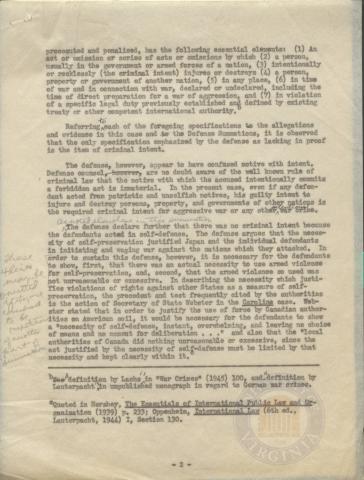
Page 2
| Parent | Item (5) April 9, 1948 |
|---|---|
| Date | 9 April 1948 |
| Language | English |
| Collection | Tavenner Papers & IMTFE Official Records |
| Box | Box 6 |
| Folder | General Reports and Memoranda from April 1948 |
| Repository | University of Virginia Law Library |
prosecuted and penalized, has the following essential elements: (1) An act or omission or series of acts or omissions by which (2) a person, usually in the government or armed forces of a nation, (3) Intentionally or recklessly (the criminal intent) injures or destroys (4) a person, property or government of another nation, (5) in any place, (6) in time of war and in connection with war, declared or undeclared, including the time of direct preparation for a war of aggression, and (7) In violation of a specific legal duty previously established and defined by existing treaty or other competent international authority.b
Referring to each of the foregoing specifications to the allegations and evidence in this case and the Defense Summations, it is observed that the only specification emphasized by the defense as lacking in proof is the item of criminal intent.
The defense, however, appear to have confused motive with intent. Defense counsel, however, are no doubt aware of the well known rule of criminal law that the motive with which the accused intentionally commits a forbidden act is immaterial. In the present case, even if any defen¬dant acted from patriotic and unselfish motives, his guilty intent to injure and destroy persons, property, and governments of other nations is the required criminal intent for aggressive war or any other war crime.
The defense declare further that there was no criminal intent because the defendants acted in self-defense. The defense argues that the necessity of self-preservation justified Japan and the individual defendants in initiating and waging war against the nations which they attacked. In order to sustain this defense, however, it is necessary for the defendants to show, first, that there was an actual necessity to use armed violence for self-preservation, and, second, that the armed violence so used was not unreasonable or excessive. In describing the necessity which justi-fies violations of rights against other States as a measure of self-preservation, the precedent and test frequently cited by the authorities is the action of Secretary of State Webster in the Caroline case. Web¬ster stated that in order to justify the use of force by Canadian author-ities on American soil, it would be necessary for the defendants to show a "necessity of self-defense, instant, overwhelming, and leaving no choice of means and no moment for deliberation . . . " and also that the "local authorities of Canada did nothing unreasonable or excessive, since the act justified by the necessity of self-defense must be limited by that necessity and kept clearly within it.c
b A definition by Lachs is in "War Crimes" (1945) 100, and a definition by Lauterpacht is in unpublished monograph in regard to German war crimes.
c Quoted in Hershey, The Essentials of International Public Law and Or-ganization (1939) p, 233; Oppenheim, International Law (6th ed., Lauterpacht, 1944) I, Section 130.
-2-
